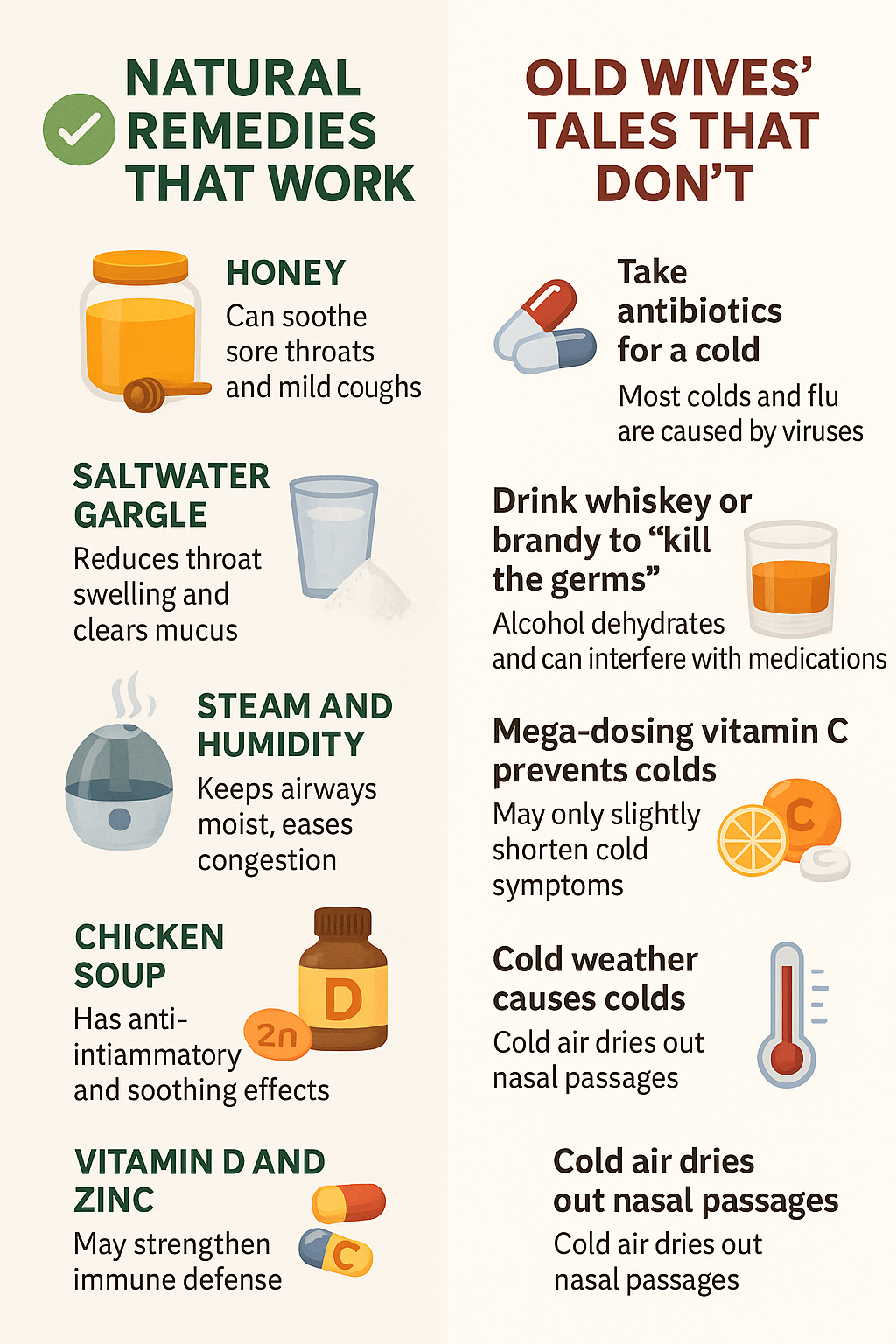When temperatures drop, colds and flu seem to spread like wildfire — and for people with chronic conditions like diabetes or high blood pressure, that can mean more than just a few sniffles. Inflammation, stress hormones, and certain over-the-counter medicines can all raise blood sugar and blood pressure levels.
So how do you stay well during cold and flu season — and which “natural” remedies actually work? Let’s separate science from folklore.

🍯 Natural Remedies That Actually Work
1. Honey (but not for everyone!)
- Why it works: Honey can soothe sore throats and mild coughs thanks to its natural antibacterial and anti-inflammatory properties.
- How to use it: Add 1–2 teaspoons to warm tea with lemon.
- Caution: If you have diabetes, use it sparingly — it still raises blood sugar. For children under 1 year old, honey is not safe.
2. Saltwater Gargle
- Why it works: A warm saltwater gargle (½ teaspoon of salt in 1 cup of warm water) reduces throat swelling and clears mucus.
- Best for: Sore throats, mild cough, or postnasal drip.
- Tip: Gargle for 15–30 seconds, 2–3 times daily.
3. Steam and Humidity
- Why it works: Dry winter air irritates your nose and throat, making cold symptoms worse. Steam inhalation or a humidifier helps keep airways moist, easing congestion.
- Bonus: Add a few drops of eucalyptus or peppermint oil (if not allergic) for extra relief.
4. Chicken Soup
- Why it works: Grandma was right — research shows chicken soup has mild anti-inflammatory effects and helps clear nasal mucus faster.
- Nutrient bonus: It provides hydration, electrolytes, and warmth that soothe the throat and stomach.
- Pro tip: Add garlic, onion, and herbs like thyme or parsley — they have natural antiviral and immune-supportive properties.
5. Vitamin D and Zinc
- Why they work: Vitamin D strengthens immune defense, especially during low-sunlight winter months. Zinc can shorten the duration of a cold if taken early.
- Sources:
- Vitamin D: sunlight, fortified milk, salmon, eggs
- Zinc: lean meats, beans, nuts, whole grains
- Note: Avoid excessive supplementation — always check with your doctor before adding new vitamins.
🪄 Old Wives’ Tales That Are Not True
“Take antibiotics for a cold.”
- ❌ NOT TRUE: Most colds and flu are caused by viruses, not bacteria. Antibiotics won’t help — and overuse can make future infections harder to treat.
“Drink whiskey or brandy to ‘kill the germs.’”
- ❌ NOT TRUE: Alcohol may make you feel warm temporarily but actually dehydrates your body and can interfere with medications — especially if you have diabetes or hypertension.
“Mega-dosing vitamin C prevents colds.”
- ❌ NOT TRUE: High doses don’t prevent illness; they may only slightly shorten symptoms. Too much vitamin C (over 2000 mg/day) can cause stomach upset and kidney stones.
“Cold weather causes colds.”
- ❌ NOT TRUE: The temperature itself doesn’t cause sickness — viruses do. But cold air dries out your nasal passages and keeps people indoors, where viruses spread more easily.

❤️ For People with Diabetes or High Blood Pressure
Stay hydrated: Water, herbal teas, and broths are best. Dehydration can make both glucose and blood pressure rise.
Be careful with cold and flu medicines: Many over-the-counter (OTC) products contain ingredients that can raise blood pressure or blood sugar.
- Medications with pseudoephedrine (like Sudafed®, Claritin-D®, Advil® Cold & Sinus) and phenylephrine (like Sudafed PE®, DayQuil®, Mucinex® Sinus-Max) can cause your numbers to go up.
- Instead, try saline sprays, humidifiers, or warm honey lemon tea for congestion and sore throat relief.
- For pain or fever, use plain acetaminophen (Tylenol®) — avoid “multi-symptom” or “D” formulas unless your doctor says they’re safe for you.
Rest and keep an eye on your readings: Being sick can raise stress hormones (like cortisol), which may temporarily increase your blood sugar. Check your levels more often until you’re feeling better.
🌿 Bottom Line
Nature really does help — rest, warm fluids, honey, herbs, and nutrients like zinc and vitamin D can support recovery. Just steer clear of quick fixes or strong decongestants that can make blood pressure or glucose spike.
Staying warm, hydrated, and mindful of your numbers will help you get through the winter months more comfortably and safely.



